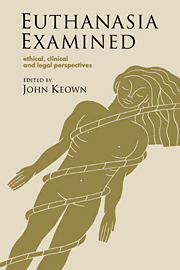Book contents
- Frontmatter
- Contents
- List of contributors
- Acknowledgements
- Foreword by Daniel Callahan
- Introduction
- 1 Euthanasia and the value of life
- 2 A philosophical case against euthanasia
- 3 The philosophical case against the philosophical case against euthanasia
- 4 The fragile case for euthanasia: a reply to John Harris
- 5 Final thoughts on final acts
- 6 Misunderstanding the case against euthanasia: response to Harris's first reply
- 7 Euthanasia: back to the future
- 8 The case for legalising voluntary euthanasia
- 9 Extracts from the Report of the House of Lords Select Committee on Medical Ethics
- 10 Walton, Davies, Boyd and the legalization of euthanasia
- 11 Where there is hope, there is life: a view from the hospice
- 12 Letting vegetative patients die
- 13 A case for sometimes tube-feeding patients in persistent vegetative state
- 14 Dilemmas at life's end: a comparative legal perspective
- 15 Physician-assisted suicide: the last bridge to active voluntary euthanasia
- 16 Euthanasia in the Netherlands: sliding down the slippery slope?
- 17 Advance directives: a legal and ethical analysis
- 18 Theological aspects of euthanasia
- Index
17 - Advance directives: a legal and ethical analysis
Published online by Cambridge University Press: 03 May 2010
- Frontmatter
- Contents
- List of contributors
- Acknowledgements
- Foreword by Daniel Callahan
- Introduction
- 1 Euthanasia and the value of life
- 2 A philosophical case against euthanasia
- 3 The philosophical case against the philosophical case against euthanasia
- 4 The fragile case for euthanasia: a reply to John Harris
- 5 Final thoughts on final acts
- 6 Misunderstanding the case against euthanasia: response to Harris's first reply
- 7 Euthanasia: back to the future
- 8 The case for legalising voluntary euthanasia
- 9 Extracts from the Report of the House of Lords Select Committee on Medical Ethics
- 10 Walton, Davies, Boyd and the legalization of euthanasia
- 11 Where there is hope, there is life: a view from the hospice
- 12 Letting vegetative patients die
- 13 A case for sometimes tube-feeding patients in persistent vegetative state
- 14 Dilemmas at life's end: a comparative legal perspective
- 15 Physician-assisted suicide: the last bridge to active voluntary euthanasia
- 16 Euthanasia in the Netherlands: sliding down the slippery slope?
- 17 Advance directives: a legal and ethical analysis
- 18 Theological aspects of euthanasia
- Index
Summary
Advance directives occupy an important place in the debate about the limits of patient autonomy, the right to refuse life–saving medical treatment and euthanasia. In February 1994, the House of Lords Select Committee on Medical Ethics strongly endorsed the use of advance directives as a way of enabling patients to express in advance their individual preferences and priorities for medical treatment in the event that they should subsequently become incompetent. The Committee felt that the preparation of advance directives could often stimulate healthy dialogue between doctor and patient about health care choices, assist health carers in decisions about appropriate treatment and provide secure knowledge for patients that their wishes have been properly documented.
With advance directives entering the public domain in increasing numbers and the recommendation by, amongst others, the Law Commission for legislation to define and regulate their use the legal and ethical debate over the effect, use, limitations and general desirability of advance directives continues to intensify. This chapter attempts to examine the present status of advance directives in English law and explore a number of the important legal and ethical questions to which they give rise.
THE NATURE AND FORM OF ADVANCE DIRECTIVES
An advance directive is essentially a stipulation made by a competent person about the medical treatment he should or should not receive in the event of his becoming incompetent to make or communicate treatment choices.
- Type
- Chapter
- Information
- Euthanasia ExaminedEthical, Clinical and Legal Perspectives, pp. 297 - 314Publisher: Cambridge University PressPrint publication year: 1995
- 2
- Cited by

